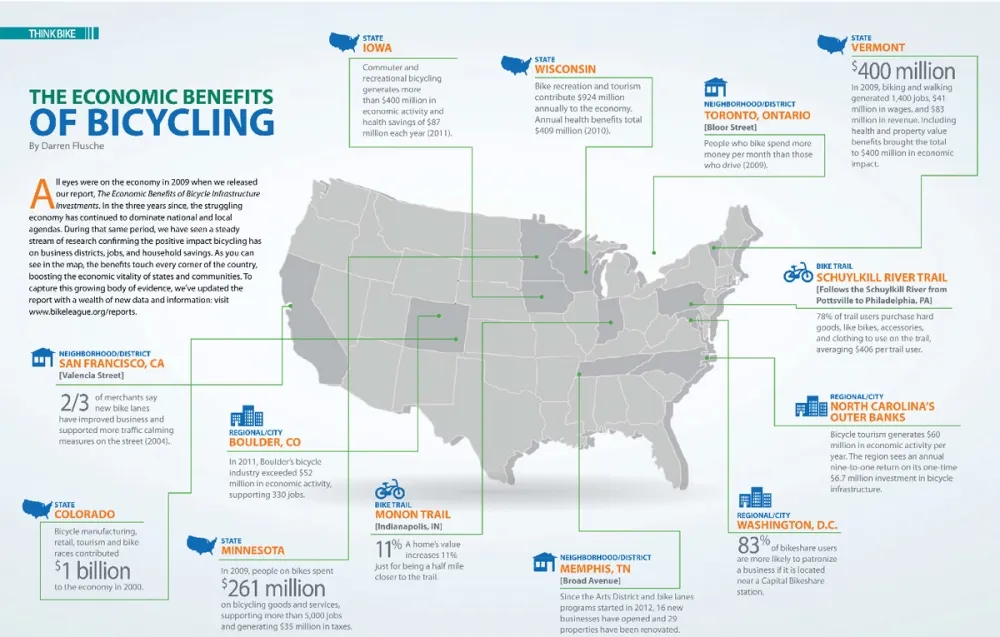It has long been agreed that bicycles are good for maintaining personal health and good for the environment. But several recent studies say bicycles are good for the economy, too.
The League of American Bicyclists compiled data from a few recent studies around the US, and provided a detailed report on the benefits of bicycling. It noted that bike recreation and tourism contributes an estimated $924 million a year to Wisconsin, plus $409 million health-related benefits. Bicycling tourism in North Carolina’s Out Banks region generates $60 million a year.
Bicycles and walking is also seen as a way to get people to invest and shop locally. The New York City pedestrian advocacy group Transportation Alternatives released the East Village Shoppers Survey, which found that promoting bicycling and walking mean more business for local shops and restaurants.
“Investing in bicycling helps local economies in many ways,” said Darren Flusche, policy director at the League of American Bicyclists. “People on bikes spend more per month at local shops than people who travel by car. People on bikes are loyal, local customers who have more money in their pockets because they are saving the money they are not spending on gas.”

A few examples of how investing in bicycling can benefit local and state economies, according to the League of American Bicyclists
“Businesses also benefit from environments that are friendly to bicycling and walking,” Flusche told BikeRadar. “Bicycle-friendly streets are places people want to spend time – that means they’ll also spend money. Memphis incorporated bicycle lanes in their successful effort to turn struggling Broad Avenue into a vibrant arts districts because bike lanes attract energetic, creative people.”
It isn’t just bicycle advocacy groups that are doing the bean counting either.
A study produced last year by Heidi Garrett-Peltier at the Political Economy Research Institute examined 58 different projects and found that $1 million invested in infrastructure produced 11.4 jobs.
Perhaps the fact that the studies are even being done should be seen as good news.
“The data is just starting to come in now,” said Tim Blumenthal, president of the Bikes Belong Coalition. “Three or four different studies and frankly the numbers look good.”
Blumenthal told BikeRadar that the cities that have been doing a better job of building a bicycle infrastructure are also seeing benefits, as those cities are doing a better job of attracting dynamic companies that in turn offer desirable jobs. “There are multiple layers of the benefits of building this infrastructure,” he added. “This started with rails to trails, and we’re seeing that there is certainly greater value for the real estate that is adjacent to those paths.”
And when people have access to those pathways they tend to be able to use them, which in turn results in shopping locally and even saying money such as filling up the tank in the car.
“When people spend money on gasoline that money is leaving the community,” said Flusche. “People on bikes have more money to spend on locally produced goods. When gas prices spiked back in 2008, we saw a lot of people thinking about alternatives to their cars. People want attractive, accessible – and affordable – transportation choices.”
Additionally, when money is spent far from home it could be the bicycle that lures that money there, namely through tourism.
“Bicycle tourism is a big part of the story,” emphasized Flusche. “People want to go to bicycle-friendly places on vacation for the same reason they want bicycle-friendly neighborhoods – it’s better by bike.”
